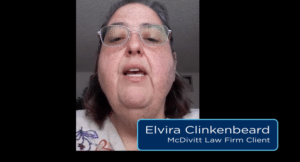Few situations are as upsetting as discovering that a loved one is being abused in a nursing home. You’ve placed your trust in this institution, expecting them to care for your elderly loved one. When they don’t, it betrays your trust and harms someone you care about.
If you’re concerned that your loved one is suffering from nursing home abuse or neglect, a Denver nursing home abuse attorney at McDivitt Law Firm can help. For over 50 years, we’ve helped families throughout Denver hold nursing homes accountable for abuse. We will fight for your family to ensure you get the compensation you need for your loved one’s recovery.

Do I Need a Denver Nursing Home Abuse Attorney?
Nursing home abuse cases are always complex. They typically involve long investigations that generate a lot of paperwork. And if the case involves federal and state law violations, criminal investigations, or wrongful death claims – which is common – the legal battle becomes even more difficult.
Working with an experienced Denver nursing home abuse attorney is essential to a winning case. Only a capable attorney working alongside a knowledgeable support team can build a solid case against the negligent institution and secure the compensation you deserve.

Why Choose McDivitt Law as Your Denver Nursing Home Abuse Attorney?
The nursing home abuse attorneys at McDivitt Law Firm have helped abuse victims and their families for more than 50 years. We pride ourselves on our ability to quickly build a detailed case capable of winning maximum compensation.
After you share your case details with us, we’ll get to work formulating our arguments. The sooner you contact us, the earlier we can build a winning case.

What is the Definition of Nursing Home Abuse?
Nursing home abuse refers to instances where a nursing home or long-term care facility resident is harmed through recklessness, malicious intent, or negligence.
When this happens, the care facility can be held liable for failing to treat their charge properly. Nursing homes have a duty to ensure all of their residents’ safety. They are responsible for any mistakes that prevent them from fulfilling that duty, including improper employee screening, inadequate employee supervision, and poor facility maintenance.
What are the Forms of Nursing Home Abuse?
The term “nursing home abuse” usually calls physical abuse to mind. However, that’s just one of the many different forms of abuse cataloged by the National Center on Elder Abuse. In truth, there are seven different categories of abuse, each with its own devastating impacts:
Physical abuse – Physical abuse involves any harmful act inflicted on nursing home residents by the care staff or other residents. It also includes inappropriate drug use, improper use of restraints, and force-feeding. A resident who is being physically abused may have scars, cuts, bruises, and broken bones
Sexual abuse – Sexual abuse includes any instances of sexual assault against an elderly resident. This includes sexual contact with a resident who is incapable of providing consent, or taking nude photos of a resident. Common signs of sexual abuse are unexplained STDs, bruising, and genital infections.
Emotional abuse – When caregivers inflict emotional pain and suffering on a resident, it’s emotional abuse. This horrible act typically includes threats, intimidation, resident isolation, and bullying. Over time, this abuse can make residents anxious, withdrawn, depressed, and agitated.
Neglect – Not all forms of abuse are committed purposefully. Carelessly or intentionally failing to care for a resident is neglect. Neglect often involves withholding food, failing to provide adequate supervision, and ignoring resident hygiene. Signs of neglect include untreated bed sores, dehydration, and malnutrition.
Abandonment – When a caregiver deserts one of their residents, that’s abandonment. Abandonment is usually discovered through verbal reports of a patient being found alone in a public place or an isolated area of the facility
Financial – Financial abuse is disappointingly common, as it directly benefits the abuser. Typical examples of financial abuse are check forgery, theft, and coercion (coercing residents to sign assets over to their caregivers, for example).
Self-neglect – Self-neglect is a major issue among the elderly, particularly for dementia patients. Any situation where a resident won’t eat, drink, take medication, or perform basic hygiene tasks constitutes self-neglect. Though the care staff did not necessarily initiate these behaviors, it is their duty to stop them and inform any relevant parties of the issue.
Each of these abuse types looks different, but they are equally serious. We believe that it’s vital to hold abusive institutions legally accountable in every case. This helps the victim’s family and can prevent abuse in the future.
Call a Denver Nursing Home Abuse Attorney at McDivitt Law to Claim Fair Compensation
If you or one of your family members has experienced nursing home abuse, you shouldn’t have to face financial hardship in addition to the pain you’ve already suffered. A Denver nursing home abuse attorney from McDivitt Law will ensure that doesn’t happen.
We only accept cases we can help with, and we don’t charge any fees until we win your case.
Request a FREE case evaluation today to find out if we can help.




